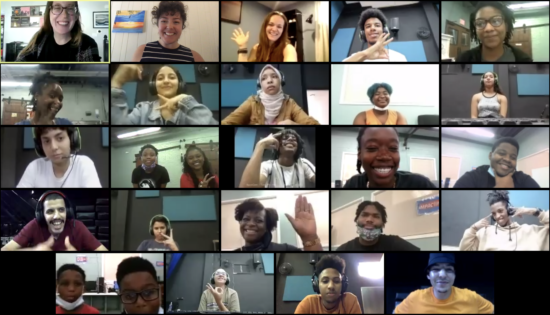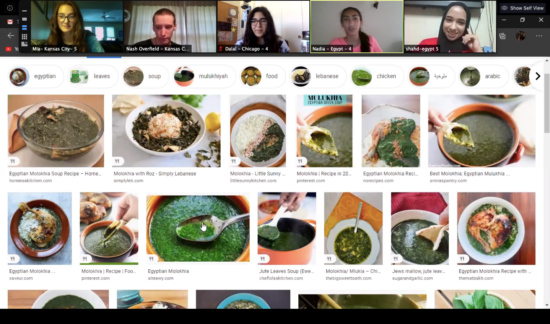Compiled by Christian Caudill, Senior Associate, Communications, Global Ties U.S.
Over the summer, several members of the Global Ties Network received grants from The Stevens Initiative, an international effort to build global competence and career readiness skills for young people in the United States and the Middle East and North Africa. Through virtual exchange, the Initiative aims to make life-changing, cross-cultural experiences available to all young people and give them the kind of meaningful international experience that shaped its namesake, Ambassador J. Christopher Stevens, as a young man. Below, Citizen Diplomacy International, Global Ties KC, Texas International Education Consortium, and WorldChicago share how their programs helped achieve that goal. The Stevens Initiative is sponsored by the U.S. Department of State, with funding provided by the U.S. Government, and is administered by the Aspen Institute. It is also supported by the Bezos Family Foundation and the governments of Morocco and the United Arab Emirates.
“These grantees’ vision was carried forth this summer through their unwavering commitment to provide a global exchange experience to communities throughout the U.S. and MENA region, despite the pandemic. The world is incredibly complicated today, and we are working together to create the next generation of leaders with an empathic, global mindset. The Initiative is proud to have been a partner to these institutions as they carried out meaningful work.” says Christine Shiau, Managing Director, Stevens Initiative.
CITIZEN DIPLOMACY INTERNATIONAL
Citizen Diplomacy International created the How to Succeed as an Innovator international exchange program for university students in Philadelphia and Egypt wanting to improve our world through science, technology, engineering, and math innovations to bridge the gap between STEM coursework and the real-life path to entrepreneurship. Participants explored topics in social entrepreneurship, studied innovative business models, and learned cross-cultural communication skills needed for global networking. After meeting with guest speakers, who are leaders in social entrepreneurship or have brought scientific discoveries to market, students reflected on the role of dialogue, stereotypes, and bias in their community and in the larger global conversation of STEM business leaders of color.
“At the core of Citizen Diplomacy’s mission is building mutual understanding across cultures. Now, as Philadelphia faces its own structural racism, Citizen Diplomacy is teaching our university students to be STEM business leaders who are prepared to have real conversations on stereotypes and bias,” says Siobhán Lyons, President and CEO of Citizen Diplomacy International.
The program was developed in part through collaborations with our IVLP and fee-for-service exchange program networks. The Stevens Initiative has been incredibly supportive and approachable to not only grantees but also applicants and has offered a number of training and mentoring sessions.
This pilot project gave us invaluable experience and we are now looking to expand this virtual exchange model. The virtual space can be an effective means for connecting people. It is critical to initially build trust, establish common ground and devise activities that maximize opportunities for all participants to engage. There are many great tools and tips to cultivate active participation depending on your program’s audience, number of participants, time-zone differences, among other factors.
We were surprised to learn how well asynchronous tools such as Google Classroom or Flipgrid cultivate conversations in addition to the synchronous activities with many participants from two continents in our zoom room. Truly, the most important and rewarding aspect of running virtual exchanges is cultivating people-to-people interactions and this is where Community-Based Members shine. – Stephanie Vogel, Director of Programs, Citizen Diplomacy International
GLOBAL TIES KC

Participants greet each other during the MOR-USA Virtual Exchange Program. Credit: Sarah Martin, Global Ties KC
Global Ties KC’s MOR-USA Virtual Exchange Program brought together approximately 20 students from Morocco and the United States for a shared collective of their artistic talents. Participants, who are primarily from schools of hip-hop intended for urban youth, created connections through the displaying of their shared talents. The program took place through three synchronous exchanges, then a series of video prompts for them to complete and view via Flipgrid.
The program creation occurred naturally through the world of exchange. Anas Bawas from Morocco was in Kansas City in September 2019 through an International Visitor Leadership Program for hip-hop artists. While in Kansas City, he met with Taylor Brown, Program Director at ArtsTech KC. When the opportunity to create a program bringing their professions together came about, the program almost curated itself. By partnering with the two organizations who already had a relationship and similar mission, the collaborative culture was instantly established. Additionally, by collaborating with organizations who already had daily access to youth hip-hop artists, it helped tremendously with recruitment, sustaining participant engagement, and student interaction.
Throughout the program, it was powerful to see the value of sharing common talents in young people. You could see the inspiration, hope, and motivation that spurred in the youth. The group dynamics were seamless from the beginning due to this shared love of art and hip-hop. Additionally, it created stunning visuals for our organization to articulate the impact of exchange, since every aspect of the program is now in video form.
Find the student created collaborative art project and other program highlights on our YouTube channel at https://www.youtube.com/channel/UCPHiUKBp46IO0cLN7bNUD3Q. – Sarah Martin, Special Program Manager, Global Ties KC
WORLDCHICAGO

Nadia (second from right) tells participants about Molokhia, a popular dish in Egypt. Credit: Yichun Chen, WorldChicago
WorldChicago’s Youth Diplomat Social Venture Virtual Exchange connected over forty high school students from Egypt, Morocco, Tunisia, and the United States to learn best practices in social entrepreneurship and design projects related to their interests in cross-country teams.
Our first challenge was designing an informative and interactive virtual experience. After some research, we modeled the program around a comprehensive, open-source social entrepreneurship curriculum, Innovate Health Yale.To better adapt to the virtual setting, our Vice President, Brian Peckrill reached out to his brother, a 6th grade teacher with experience in virtual learning. He suggested using tools like Google Classroom and Flipgrid, and gave advice on how to keep students engaged by presenting the material in various formats and collecting student feedback throughout the program.
“I think the biggest advantage of virtual programming is its flexibility. Compared to in-person programs, there’s more room for making changes along the way to better meet participants’ needs and achieve our goals,” Brian said.
In designing the exchange, our biggest asset was not the curriculum itself, but the network that allowed us to create an immersive and community-based program. We worked with long-time partner Hands Along the Nile Development Services to recruit students in Egypt, Morocco, and Tunisia, and Global Ties Kansas City and the Obama Youth Jobs Corps to recruit U.S. participants. For guest speakers, we invited fellows and community organizations who have worked with our exchange programs in the past.
Testimonies from participants affirmed that the program’s impact lies in building connections and inspiring youths to be changemakers in their own communities.
For Dalal, a high school junior from Chicago, this experience showed that “even though we come from such different backgrounds, none of that should be a barrier for sharing ideas and collaboration.”
For Sara, a Moroccan student who is still unsure about her career goals, this program “100% opened [her] eyes to career options that [she] never considered before.”
Fatma, a recent high school graduate in Tunisia, wants to take the social entrepreneurship skills she learned from the program to create a platform to improve the educational experience for Tunisian youth.
Ultimately, the Youth Diplomat Social Venture Virtual Exchange showed students that they could make an impact, while also offering a sense of connectedness during this isolating time. – Yichun Chen, Program Associate, WorldChicago
TEXAS INTERNATIONAL EDUCATION CONSORTIUM
I am a long-time proponent of virtual exchange. Even before the COVID-19 pandemic, I had goals of bringing a statewide virtual exchange model to Texas International Education Consortium’s membership of 31 Texas universities. The Stevens Initiative Coronavirus Response grant offered us an opportunity to test a model that focuses on our future frontline health care workers, namely nurses, at a critical time for global cooperation in the medical field.
TIEC’s project matched nursing faculty from within its existing university networks in Egypt and Jordan with peers from eight Texas colleges of nursing. The TIEC team provided training on three different models of virtual exchange to prepare them to conduct exchanges for their classes during the upcoming academic year. TIEC sees the value of virtual exchange for nurses as providing intercultural competence and confidence early in their academic careers and helping students who traditionally cannot afford the time away or funds to participate in study abroad programs experience the benefits of exchange.
Faculty received a “Virtual Exchange Bootcamp” to provide foundational skills and knowledge through training from the SUNY COIL Center, John Hopkins University, and Soliya. Universities were paired based on semester and course content and faculty teams spent July collaboratively designing virtual exchanges to be conducted during the fall or spring. During the design phase, TIEC coaches mentored the teams, who presented their plans back to the group in a closing meeting. TIEC continues to provide support via the online community group it created as the teams begin to implement their virtual exchanges this semester, providing ongoing resources and announcements.
This program was TIEC’s initial venture into the virtual exchange space and the team had a fantastic experience facilitating this program. Virtual exchange supports the organization’s mission of building global educational partnerships between Texas and the world and, while it is a timely alternative to traditional study abroad for the many students who cannot participate in those physical exchange programs, it offers incredible 21st Century skills in its own right. TIEC hopes to continue to develop its virtual program going forward, moving to additional fields of study, and leveraging its consortium and connections in the MENA region. – Robin Lerner, president & CEO of the Texas International Education Consortium
